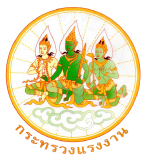Normal 0 false false false MicrosoftInternetExplorer4 st1\:*{behavior:url(#ieooui) } /* Style Definitions */ table.MsoNormalTable {mso-style-name:”Table Normal”; mso-tstyle-rowband-size:0; mso-tstyle-colband-size:0; mso-style-noshow:yes; mso-style-parent:””; mso-padding-alt:0cm 5.4pt 0cm 5.4pt; mso-para-margin:0cm; mso-para-margin-bottom:.0001pt; mso-pagination:widow-orphan; font-size:10.0pt; font-family:”Times New Roman”; mso-bidi-font-family:”Times New Roman”; mso-ansi-language:#0400; mso-fareast-language:#0400; mso-bidi-language:#0400;}
On 2 July 2011, Labour Section of the Royal Thai Embassy in Tel-Aviv went to visit Thai workers working at 2 orchard farms in Moshav Alugote and Safia in Ashkelon.
Moshav Alugote operates an orchard farm growing grape, apple, pomegranate, and litchi. The farm covers the land area of 225 rai. At the Moshav, Labour Section’s officials met with 8 Thai workers –1 female and 7 male – working in the grape farm. A normal working hour in the Moshav is 6am to 4pm. The workers have an income of around 4,500 – 5,000 baht. They are allowed to withdraw some 1,000 shekels each month; thus they could save a lot of their income and send them back home. The workers spend their free time playing soccer and sepak takraw.
At Moshav Safia, Labour Section’s officials could talk with as many as 15 Thai workers as workers were off their work on the officials’ arriving day. The Moshav operates an orchid farm growing artichokes and winter fruit such as grape, apricot, and peach. The workers have an income of 4,000 shekel and their employer help them transferring money back home each month. The officials were asked about tax refund procedure and flight arrangement. They also told the worker to contact the Labor Section should they have any problem. Before leaving, the officials gave the workers sport gear and national flags to the workers.
The Labour Section will work to improve living condition of workers of these two Moshavs. It will coordinate with the Moshavs’ owners in arranging a shared bedroom for each 2 workers, a shared kitchen with some facilities including microwaves, oven, and washing machine.




